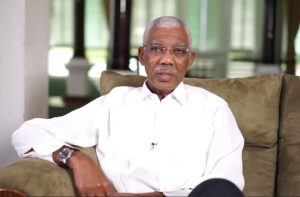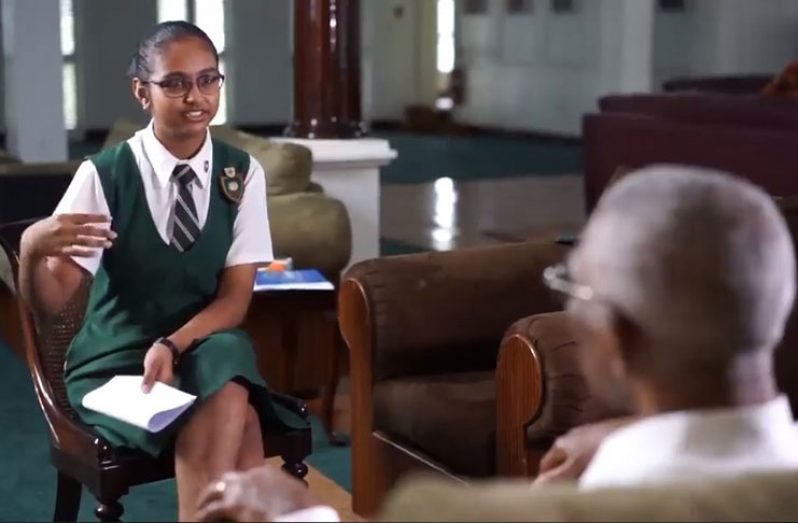PRESIDENT David Granger is hoping to one day have a “top school” in each of the country’s ten administrative regions, so as to do away with the stigma of who’s bright and who’s not.
“I hope that one day we wouldn’t be speaking about top five schools, but top ten schools. Every region should have an ‘A Grade’ School, so that persons wouldn’t believe that they need to come to town to get a good education,” he said. “I am hoping that we’ll be able to provide quality education within the regions, so that children can stay within their region for secondary level education,” President Granger told Bishop’s High School (BHS)’s Shania Madramuthu during an interview on Thursday at the Ministry of the Presidency.
The subject came up during a candid discussion with Madramuthu on his vision for the education sector, which is to have a nation of fully educated people.
NO MORE ‘BRIGHT’ OR ‘DULL’
It all began with what he thought about this year’s National Grade Six Assessment (NGSA)’s results, and President Granger said that while he congratulates all those pupils who have done very well, he believes that the ‘exam’ should be seen as a normal part of a child’s education, and shouldn’t be used to label them as either ‘bright’ and ‘dull’.
It’s a stigma, he said, that the government is working assiduously on dispelling; to erase the distinction between the so-called “top schools” and those that are not regarded so highly.
President Granger said that ideally, his vision for Guyana is to have a completely educated nation, and that as far as he and his government are concerned, education is of paramount importance to every facet of life.

“To start with, it is the basis of equality. I believe we should have a more egalitarian society. I believe that the distinction between the coastland and hinterland should be erased. The distinction between rich and poor should be erased, and the distinction among ethnic groups and the distinction between genders should all be erased,” President Granger said.
“I think education is a great equaliser, and I am very confident that if all Guyanese were exposed to the same quality of education, we’d have a more happy society; happy households and happy communities. So, above everything else, I think education guarantees equality,” he added.
THE GREATER EQUALISER
And in his belief that the public school system is a greater equaliser, given that children and teachers are more exposed to children from different backgrounds, he is of the opinion that integrating these backgrounds is where equality starts.
“It is also, in my view,” he said, “that education is important for empowerment. If you’re uneducated, it is difficult to get a job; to be employed or self-employed, especially now that we live in a very competitive world. So I think educated nations and educated people will stand a better opportunity; a better chance to reach prosperity and have a good life.”
Noting that an educated nation is also good for the economy, the president said, “If you have a lot of educated people, it means that there will be a lot of opportunities for technological development and industrial progress.”
INVESTMENT IN EDUCATION
He said that is in light of the foregoing that the ‘Coalition’ government has, since taking office in 2015, invested over $172B in the education sector.
He said that the first thing they noticed was that the school dropout rate was extremely high. He said that according to the statistics, in the early 2000s, children were dropping out three or four a day, and a lot of young people were not employed. Thankfully, all that has since changed, as the government has been doing everything financially possible to improve the system.
He listed as being among those investments to which he referred the 5Bs Initiative, as well as the improvements effected to over 100 schools, and the building of new ones in both rural and hinterland areas.




.jpg)









